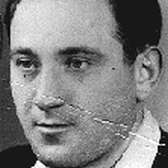
Isachar was born to a Jewish family in the Polish city of Radom, approximately 75 miles south of Warsaw. The city was the center of Poland’s leather-tanning industry. Isachar’s father worked as a salesman for a nearby tanning factory. His father was a successful salesman and the family lived comfortably.
1933-39: During registration for my first-grade class in 1934, a Jewish boy was pushed down the stairs. When my mother confronted the principal about the incident, all he said was that the boy had no business being there. As the only Jew in my class, I was beaten up often. It was hard to keep my mind on my work. After a year, I transferred to another school. Other Jewish boys studied there, so we at least had a chance to fight back.
1940-44: A ghetto was set up in Radom in 1941. Three years later, when I was 17, I was deported to a subcamp of Natzweiler to build an airstrip. Desperate for food, I sneaked away from my work detail to a farm owned by a woman who cooked for the camp’s German guards. About to reach into the produce shed, I suddenly felt a gun in my back. “Hands up!” I turned around. “My God, you’re only a baby,” she said. “We’re short on potatoes,” she added quietly, and left. Taking garlic and carrots, I sneaked back to my detail.
In April 1945 Isachar was transported from Dachau into Austria where his guards deserted his column. Liberated by the U.S. Army, he emigrated to the United States in 1948.
Why Irving Volunteered
I volunteer in the USHMM because I would like to contribute my first hand knowledge of the events that happened during the Holocaust to preserve the facts from being distorted. I would like to utilize my knowledge of pertinent languages to translate and digitize existing data for future researchers on the subject of the Holocaust. I enjoy working in a stimulating environment.
